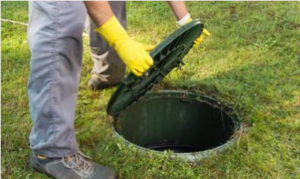
photo credit-ABC Cesspools And Septic Plumbing in Waimea
There has been a movement to use point of sale to get sellers to put in septic tanks before they can sell the property, but at the rate of home turnover, it would take decades to solve the problem. The Legislature is examining the creation of a working group within the Department of Health comprised of legislators, state and county officials, scientists and financial experts to determine how to absorb the cost and meet timelines that could be accelerated for priority areas. Establishing such a group is at the center of two measures currently in conference committee, House Bill 2626 and Senate Bill 2567, which through the amendment process would now each achieve essentially the same outcome.
The group would offer up a report to the Legislature no later than the final day of 2019. One of several stated purposes of the proposed group is to offer recommendations on how DOH can convert cesspools or connect them to sewers within 15 years. New septic systems cost between $8,000- $20,000 per household based on property size and location for cesspool conversion or connection. SB 2567, in its original form, would have mandated a point of sale conversion requirement that homeowners with cesspools connect to a sewer or septic tank prior to any sale.
Not anymore. “Nobody is looking at mandating that at this point,” Lowen said. Any legislation to that effect would be met with significant resistance by both real estate agents and homeowners, she added, as it would impact property values. It’s unlikely banks would specify that the cost be picked up by buyer or seller, but would allow the conversion cost burden to be negotiated as part of the sale. The stipulation is likely to come in a couple years, regardless of any action by state lawmakers, however. Lowen said legislators recently met with representatives of one bank who explained that by 2020, mortgage institutions may include cesspool conversion requirements in any property sale.
At that point, a standard 30-year mortgage would still be active by the time the 2050 conversion law passed in 2018 by the Legislature kicks in. Currently, $7.5 million of the $12.9 million operating budget for sewers comes from user fees. About $3 million comes from the general fund and the rest is made up with fund balance and reserves, according to county budget documents. The current $27 monthly fee for single-family and multi-family residential units would increase to $39 monthly on March 1, 2019, $46 monthly in 2020 and $52 monthly in 2021, under the plan.
Nonresidential rates would increase from $22 monthly to $50 monthly March 1, 2019 to $59 monthly in 2020 and $66 monthly in 2021. Septic haulers’ rates will also increase for those who have septic tanks pumped. The fee hikes would bring in an extra $17 million over the next three years. They would start March 1, 2019, if approved. The funds will also cover hiring more people to oversee the plan. Hawaii County has by far the lowest sewer fees in the state, and they haven’t been raised since 2002. The county is under a mandate to close its cesspools over the next 30 years.
Background info:
What is Act 125?
Signed into law in July of 2017, Act 125 requires all cesspools to be upgraded, converted to a septic system, or connected to a sewer system by Jan. 1, 2050.
What is Act 120?
Act 120 provides a temporary income tax credit for the cost of upgrading or converting a qualified cesspool to a septic tank system or an aerobic treatment unit system, or connecting to a sewer system. A taxpayer may apply for a tax credit of up to $10,000 for each qualified cesspool. The tax credit starts in tax year 2016 and ends in tax year 2020. There is a $5,000,000 cap that is available for each tax year. Any taxpayer who is not eligible to claim the credit in a taxable year shall be eligible to claim the credit in the subsequent taxable years up to 2020. Only cesspools located within 500 feet of a shoreline, perennial stream, wetland, or within a source water assessment program area (two year time of travel from a cesspool to a public drinking water source) are eligible for the tax credit. https://www.capitol.hawaii.gov/Archives/measure_indiv_Archives.aspx?billtype=HB&billnumber=1802&year=2018
LUVA Real Estate will continue to monitor this issue. As part of our work with the West Hawaii Association of Realtors and Hawaii Realtors Association, we have worked hard to AVOID makING the responsibility and costs rest squarely on homeowners, but the public in general, who also benefit from the end of cesspools in Hawaii County.